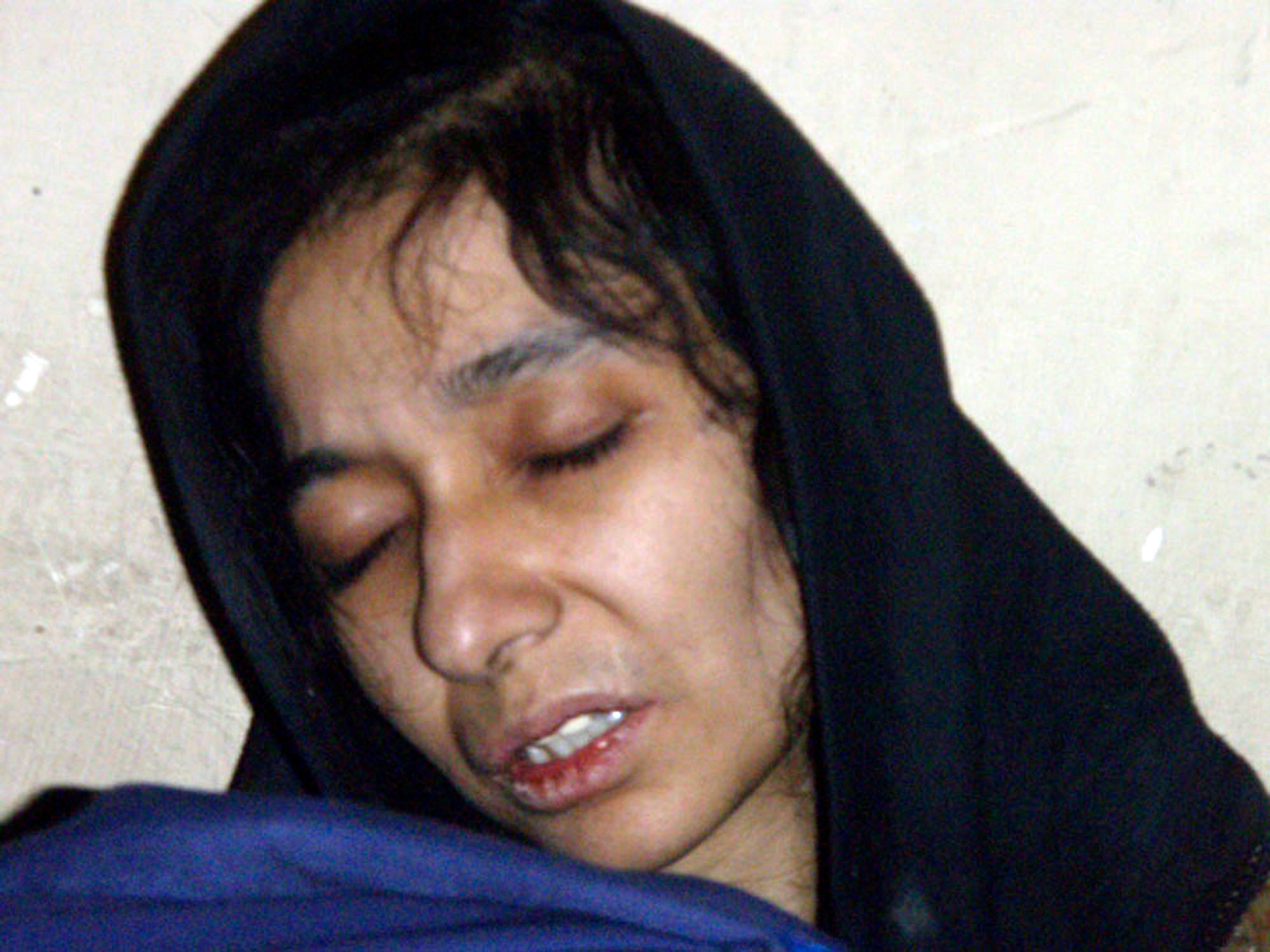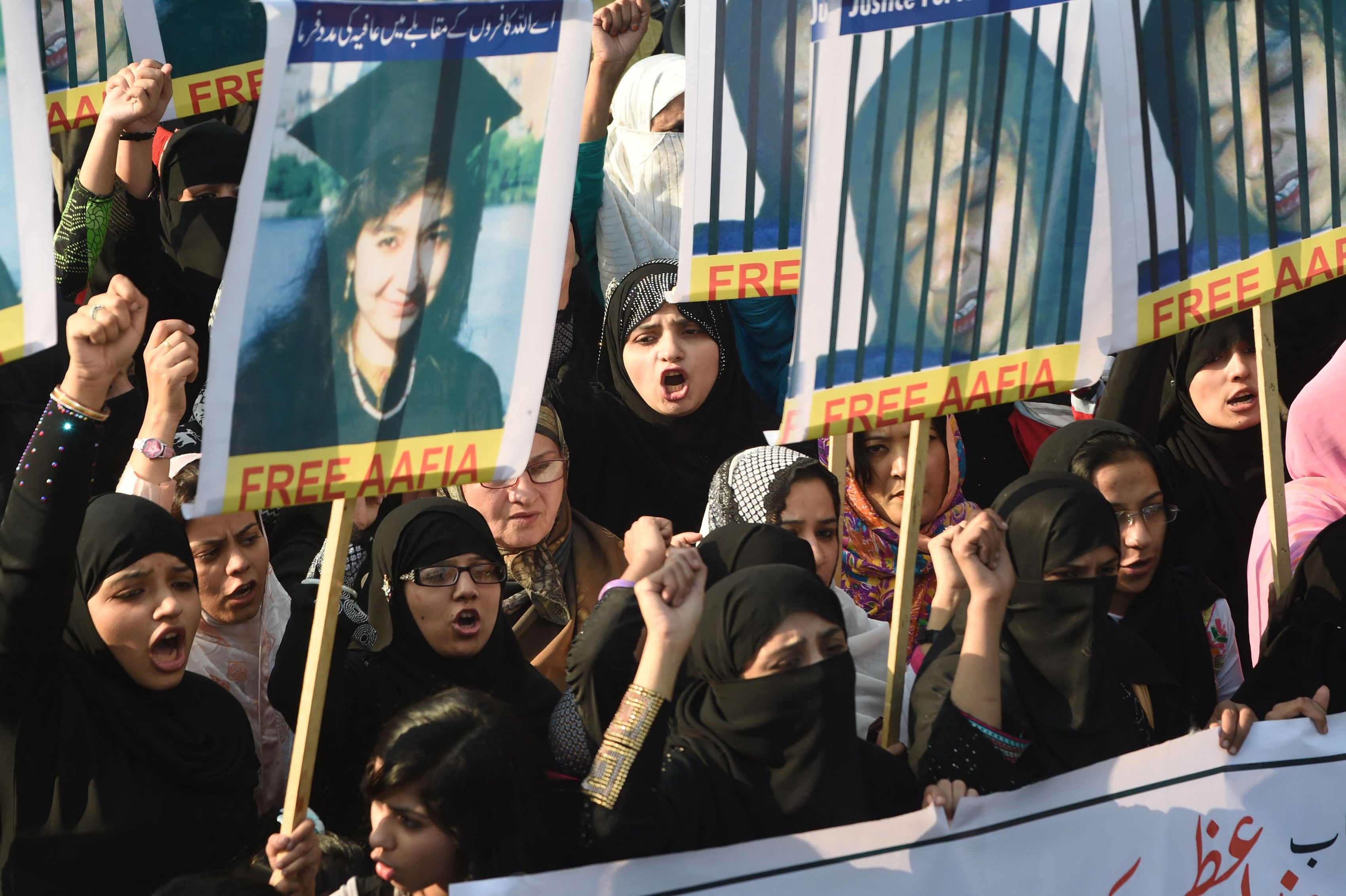Texas synagogue attack: Who is Aafia Siddiqui? A federal prisoner linked to the hostage situation
Siddiqui’s attorney denies the Pakistani neuroscientist had any involvement in ‘wicked’ actions

Your support helps us to tell the story
From reproductive rights to climate change to Big Tech, The Independent is on the ground when the story is developing. Whether it's investigating the financials of Elon Musk's pro-Trump PAC or producing our latest documentary, 'The A Word', which shines a light on the American women fighting for reproductive rights, we know how important it is to parse out the facts from the messaging.
At such a critical moment in US history, we need reporters on the ground. Your donation allows us to keep sending journalists to speak to both sides of the story.
The Independent is trusted by Americans across the entire political spectrum. And unlike many other quality news outlets, we choose not to lock Americans out of our reporting and analysis with paywalls. We believe quality journalism should be available to everyone, paid for by those who can afford it.
Your support makes all the difference.A dramatic hostage situation ended on Saturday night as police freed four hostages from a Texas synagogue following a 10-hour stand-off of threats and negotiations.
Malik Faisal Akram, 44, a British citizen from Blackburn who was identified as the prime suspect in the incident, was shot dead following the standoff with police in Colleyville.
But before he was killed, officials said the hostage-taker was heard demanding the release of Aafia Siddiqui – a Pakistani neuroscientist serving 86 years prison time in a US jail for attempts to kill US soldiers in Afghanistan.
Officials said Akram asked to speak to Siddiqui, who is lodged in a prison in Forth Worth, Texas, which is about 20 miles away from the synagogue.
In an incident that was being live-streamed on Facebook after the live Shabbat service was left running, Akram demanded his “sister” be brought to the synagogue. However, her real brother denied involvement.
"I just want a bullet in me, and I want to go — that’s it," Akram was heard saying in the livestream, reported CNN.
The incident, which was described as an "act of terror" by US president Joe Biden, has again put a spotlight on Siddiqui, who has been dubbed Lady al-Qaeda in the past, while some Pakistani political leaders and her supporters view her as a victim of the American criminal justice system.
Who is Aafia Siddiqui?
Siddiqui is a Pakistani neuroscientist who studied at US institutions including Brandeis University and the Massachusetts Institute of Technology (MIT).
She went on to attract the attention of American law enforcement in the years after the 9/11 attacks, however, with the FBI and Justice Department describing her as an “al-Qaeda operative and facilitator” at a May 2004 news conference in which they warned of intelligence showing al-Qaeda planned an attack in the coming months.
In 2008 she was detained by authorities in Afghanistan after American officials said they found in her possession of handwritten notes that discussed the construction of so-called “dirty bombs” and that listed various locations in the US that could be targeted in a “mass casualty attack”.

Inside an interview room at an Afghan police compound, authorities say, she grabbed the M-4 rifle of a US Army officer and opened fire on members of the US team assigned to interrogate her.
She was convicted in 2010 on charges including attempting to kill US nationals outside the United States. At her sentencing hearing, she gave rambling statements in which she delivered a message of world peace — and also forgave the judge. She expressed frustration at arguments from her own lawyers who said she deserved leniency because she was mentally ill.
"I’m not paranoid,” she said at one point. “I don’t agree with that.”
What was the reaction in Pakistan?
Pakistani officials immediately decried the punishment, which prompted protests in multiple cities and criticism in the media.
The prime minister at the time, Yousuf Raza Gilani, called her the “daughter of the nation” and vowed to campaign for her release from jail.
In the years since, Pakistani leaders have openly floated the idea of swaps or deals that could result in her release.
Faizan Syed, executive director of the Council on American-Islamic Relations in Dallas Fort-Worth Texas, said the group considers Siddiqui to have been “caught in the war on terror" and a political prisoner who was wrongly accused through flawed evidence.

He nonetheless strongly condemned the hostage-taking, calling it wrong, heinous and "something that is completely undermining our efforts to get Dr Aaifa released.”
Since her arrest, she has also garnered support from accused militants in the US. An Ohio man who admitted he plotted to kill US military members after receiving training in Syria also planned to fly to Texas and attack the federal prison where Siddiqui is being held in an attempt to free her. The man, Abdirahman Sheik Mohamud, was sentenced in 2018 to 22 years in prison.
What is the latest on Siddiqui's imprisonment?
Siddiqui is being held at a federal prison in Fort Worth, Texas. She was attacked in July by another inmate at the facility and suffered serious injuries, according to court documents.
In a lawsuit against the federal Bureau of Prisons, Siddiqui’s lawyers said another inmate “smashed a coffee mug filled with scalding hot liquid” into her face. When Siddiqui curled herself into the foetal position, the other woman began to punch and kick her, leaving her with injuries so severe that she needed to be taken by wheelchair to the prison’s medical unit, the suit says.
Siddiqui was left with burns around her eyes and a three-inch scar near her left eye, the lawsuit says. She also suffered bruises on her arms and legs and an injury to her cheek.
The attack prompted protests by human rights activists and religious groups, calling for improved prison conditions. The activists have also called on the Pakistani government to fight for her release from US custody.
On the hostage incident, Siddiqui’s attorney Marwa Elbially said Akram’s “actions are wicked and directly undermine those of us who are seeking justice” for the Pakistani neuroscientist.
John Floyd, chair of the board for the Houston chapter of the Council on American-Islamic Relations and lawyer for Siddiqui’s brother, also said he “has nothing to do with Dr Aafia, her family, or the global campaign to get justice for Dr Aafia”.
Additional reporting by agencies


